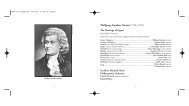ARTHUR RUBINSTEIN (1887â1982) DIMITRI ... - Chandos
ARTHUR RUBINSTEIN (1887â1982) DIMITRI ... - Chandos
ARTHUR RUBINSTEIN (1887â1982) DIMITRI ... - Chandos
Create successful ePaper yourself
Turn your PDF publications into a flip-book with our unique Google optimized e-Paper software.
Guild GmbH<br />
Switzerland<br />
GHCD 2355<br />
2009 Guild GmbH<br />
© 2009 Guild GmbH<br />
<strong>ARTHUR</strong> <strong>RUBINSTEIN</strong> (1887–1982)<br />
<strong>DIMITRI</strong> MITROPOULOS (1896–1960)<br />
1<br />
2<br />
3<br />
4<br />
5<br />
6<br />
ALEXANDER BORODIN (1833-1887)<br />
In the Steppes of Central Asia – musical picture 7:44<br />
CAMILLE SAINT-SAËNS (1835-1921)<br />
Piano Concerto No.2 in G minor, Op.22 ‡<br />
I. Andante sostenuto 10:47<br />
II. Allegro scherzando 5:53<br />
III. Presto 6:03<br />
CÉSAR FRANCK (1822-1890)<br />
Symphonic Variations – piano and orchestra ‡ 14:21<br />
ALEXANDER SCRIABIN (1872-1915)<br />
Le Poeme de l'extase ('Poem of Ecstasy'), Op.54 18:17<br />
<strong>ARTHUR</strong> <strong>RUBINSTEIN</strong> piano ‡<br />
NEW YORK PHILHARMONIC ORCHESTRA<br />
conducted by<br />
<strong>DIMITRI</strong> MITROPOULOS<br />
(Complete Concert, Carnegie Hall, 19 April 1953)
A GUILD HISTORICAL RELEASE<br />
• Remastering: Peter Reynolds<br />
• Final master preparation: Reynolds Mastering, Colchester, England<br />
• Recording made available by courtesy of Claudio von Förster<br />
• Design: Paul Brooks, Design & Print – Oxford<br />
• Art direction: Guild GmbH<br />
• Executive co-ordination: Guild GmbH<br />
• Photographs courtesy of The Tully Potter Collection<br />
■<br />
■<br />
■<br />
Guild GmbH, Moskau 314b, 8262 Ramsen, Switzerland<br />
Tel: +41 (0) 52 742 85 00 Fax: +41 (0) 52 742 85 09 (Head Office)<br />
Guild GmbH, PO Box 5092, Colchester, Essex CO1 1FN, Great Britain<br />
e-mail: info@guildmusic.com World WideWeb-Site: http://www.guildmusic.com<br />
WARNING: Copyright subsists in all recordings under this label. Any unauthorised broadcasting, public<br />
performance, copying or re-recording thereof in any manner whatsoever will constitute an infringement of such<br />
copyright. In the United Kingdom licences for the use of recordings for public performance may be obtained from<br />
Phonographic Performances Ltd., 1 Upper James Street, London W1F 9EE.
The performing career of the great pianist Arthur Rubinstein was probably the longest<br />
in history; it was also one of the most illustrious. Rubinstein was born in the Polish<br />
city of Lodz in January, 1887 and he made his first public appearance in December,<br />
1894 at a charity concert at the age of seven. He last played in public in London, a recital<br />
at the Wigmore Hall, in 1976, at the age of 89, with his powers undiminished, including<br />
a performance of Schumann’s Carnaval that will forever remain in the memory of those<br />
who heard it.<br />
In the first volume of his autobiography My Young Years, published in 1973, he said he<br />
‘was introduced to Brahms’ in 1896 - when Rubinstein was nine - although whether this<br />
statement referred to meeting Brahms himself, or coming into contact with Brahms’s music<br />
for the first time, was always, to some degree, doubtful. On the other hand, Rubinstein’s<br />
powers of recall remained remarkably intact, even after his retirement from the concert<br />
platform, well into his 90s, and one must assume that for a very musical 9-year-old,<br />
meeting the great composer would have made a lasting impression. What cannot be denied<br />
is that opportunities for the young Rubinstein to meet with Brahms certainly existed, and<br />
it is beyond dispute that the boy was very strongly encouraged by Joseph Joachim in the<br />
late 1890s, immediately following Brahms’s death. It is unlikely that Joachim would have<br />
done this had the boy not shown a marked empathy for Brahms’s music – although, of<br />
course, he was still a boy. According to Daniel Barenboim, Rubinstein said that Brahms’s<br />
music was his first and greatest love; and it was Joachim who conducted for Rubinstein’s<br />
official debut, in Berlin in 1900, when he played a Mozart Concerto at the age of 13.<br />
From the start of Rubinstein’s career, his artistry was self-evident, and during the next<br />
three-quarters of a century he became one of the most admired pianists before the public.<br />
In 1905, still only 18 years old, he moved to Paris, meeting many of the most famous<br />
musicians of the day, including Saint-Saëns, who commended Rubinstein warmly on<br />
hearing him play his Second Piano Concerto in G minor. The following year, still not quite<br />
19, Rubinstein made his American debut at Carnegie Hall in that self-same Saint-Saëns<br />
3
Concerto. Thus, through this recording of a complete Carnegie Hall concert from 47 years<br />
later, we can hear a matchless performance of the work by a pianist whose interpretation<br />
elicited praise from the composer himself.<br />
In the course of pursuing a world-wide career from that first decade of the 20th-century,<br />
and making many recordings over more than 50 years, by the time of this concert in 1953<br />
Rubinstein had established homes in Europe (in Paris and Geneva) and in the United States<br />
(in Beverly Hills and New York). Although his Carnegie Hall debut in 1906 had been with<br />
the Philadelphia Orchestra, Rubinstein forged close links with all the major American<br />
orchestras, especially in concert with the New York Philharmonic (the Philharmonic-<br />
Symphony Orchestra of New York, to give it its proper title at the time). Rubinstein and<br />
the Philharmonic could not record together commercially – at least, ostensibly under the<br />
Orchestra’s name – for they were under exclusive contract to rival companies, Rubinstein<br />
to RCA and the Philharmonic to CBS. Therefore, the existence of an off-air recording of<br />
pianist and orchestra together affords the music-lover with a rare opportunity of hearing<br />
the partnership ‘on the wing’, so to speak - in this instance with two concertos in the same<br />
programme.<br />
One of the more remarkable characteristics of Rubinstein’s concert-giving was that<br />
he would often perform more than one concerto in a programme; certainly, in London<br />
in his final year as a concert artist, and at the age of 88, he played no fewer than three on<br />
one occasion at the Royal Albert Hall, with Daniel Barenboim conducting the London<br />
Philharmonic – the concertos being all by Beethoven, the Third, Fourth and Fifth!<br />
Rubinstein’s early years in Paris, and his profound life-long empathy with French music<br />
and culture, especially in the few decades following the appearance of these works, give his<br />
performances of the Saint-Saëns Concerto and of Cesar Franck’s Variations Symphoniques a<br />
special authority, made more valuable by the partnership of the Philharmonic under its<br />
then chief conductor Dmitri Mitropoulos.<br />
Mitropoulos was one of the most astonishingly gifted all-round musicians of his day. A<br />
great conductor – of that, there can be no doubt – and a staggeringly gifted pianist as well,<br />
as well as a composer, this Greek-born musician possessed a phenomenal photographic<br />
memory. He never used a score, even at rehearsals (for example, he gave the American<br />
premiere of Berg’s opera Wozzeck, reportedly taking all 18 rehearsals without a score, calling<br />
out bar numbers and rehearsal letters to the participants when necessary). His partnership<br />
with Rubinstein in these performances is exemplary. Although Rubinstein had been born<br />
in Poland, and Mitropoulos in Greece, they had both became naturalised American citizens<br />
in the same year, 1946.<br />
We can hear Mitropoulos by himself, so to speak, in the two other works in the<br />
programme – Borodin’s In the Steppes of Central Asia and Scriabin’s Poem of Ecstasy – the latter<br />
work being one of which Mitropoulos was particularly fond, although older New Yorkers<br />
present on this occasion might well have recalled both the circumstances which led Scriabin<br />
and his female companion to leave the city in 1907 under a cloud of disapprobation, and<br />
the world premiere of the Poem of Ecstasy which the Russian-born conductor Modest<br />
Altschuler gave in New York in 1908.<br />
Be that as it may, there is no question that in these two purely orchestral colourful<br />
masterpieces, Mitropoulos demonstrates his great qualities as a conductor of Russian<br />
music, and the outstanding playing of this world-class orchestra – an ensemble older, in<br />
fact, than the Vienna Philharmonic – particularly in the high Romanticism of Scriabin’s<br />
Poem, the more sensual characteristics of which are finely conveyed by a profound sense<br />
of underlying architectural strength supporting a wondrous sense of atmosphere and<br />
sheer feeling for beauty, attributes of a great conductor and orchestra still apparent to the<br />
attentive listener from a broadcast of more than half a century ago.<br />
© Robert Matthew-Walker, 2009<br />
4 5
GHCD 2355<br />
<strong>RUBINSTEIN</strong> • MITROPOULOS • New York, 1953 GHCD 2355<br />
ALEXANDER BORODIN (1833-1887)<br />
In the Steppes of Central Asia – musical picture<br />
These are rare ’live’ recordings from second generation transcriptions which have been remastered to a high<br />
standard; however some patches of noise, dropouts and distortion remain.<br />
2009 Guild GmbH © 2009 Guild GmbH Printed and made in England<br />
Guild GmbH • Switzerland<br />
CAMILLE SAINT-SAËNS (1835-1921)<br />
Piano Concerto No.2 in G minor, Op.22 ‡<br />
I. Andante sostenuto II. Allegro scherzando<br />
III. Presto<br />
CÉSAR FRANCK (1822-1890)<br />
Symphonic Variations – piano and orchestra ‡<br />
ALEXANDER SCRIABIN (1872-1915)<br />
Le Poeme de l'extase ('Poem of Ecstasy'), Op.54<br />
<strong>ARTHUR</strong> <strong>RUBINSTEIN</strong> piano ‡<br />
NEW YORK PHILHARMONIC ORCHESTRA<br />
conducted by<br />
<strong>DIMITRI</strong> MITROPOULOS<br />
(Complete Concert, Carnegie Hall, 19 April 1953)<br />
Total Time: 63:44<br />
ADD<br />
<strong>RUBINSTEIN</strong> • MITROPOULOS • New York, 1953 GHCD 2355

















